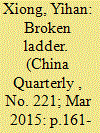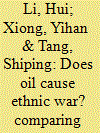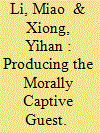| Srl | Item |
| 1 |
ID:
139550


|
|
|
|
|
| Summary/Abstract |
This paper attempts to explain why education fails to facilitate upward mobility for migrant children in China. By comparing a public school and a private migrant school in Shanghai, two mechanisms are found to underpin the reproduction of the class system: the ceiling effect, which is at work in public schools, and the counter-school culture, which prevails in private migrant schools. Both mechanisms might be understood as adaptations to the external circumstances of – and institutional discrimination against – migrants rather than as resistance to the prevailing institutional systems. Thus, the functioning of these mechanisms further strengthens the inequality embodied in the system.
|
|
|
|
|
|
|
|
|
|
|
|
|
|
|
|
| 2 |
ID:
153174


|
|
|
|
|
| Summary/Abstract |
This article contributes both empirically and methodologically. Empirically, we seek to advance our understanding of an important puzzle: does oil cause ethnic war? Methodologically, we seek to identify more precisely the different weaknesses and strengths of the quantitative approach and case studies with process-tracing by explicitly comparing results from these two approaches on the same empirical question. We thus subject the statistical association between the ethnogeographical location of oil and the onset of ethnic war to test with process-tracing. Examining several pathway cases, we find that oil has rarely been a deep cause of ethnic war. Instead, the ethnogeographical location of oil either reignites dormant conflict that has deeper roots in ethnic resentment and hatred or intensifies ongoing conflict, mostly by facilitating the operation of two interconnected mechanisms. Our study echoes the notion that quantitative exercises alone often cannot establish specific causal mechanisms or how contextual factors impact the operation of these mechanisms, and it is precisely on these two key fronts that qualitative exercises possess critical advantages. Hence, quantitative methods and qualitative methods are complementary rather than competitive. Our study also yields important policy implications for preventing and managing ethnic conflict in countries with rich mineral resource.
|
|
|
|
|
|
|
|
|
|
|
|
|
|
|
|
| 3 |
ID:
169795


|
|
|
|
|
| Summary/Abstract |
To promote a prosocial conscience and behaviour, gratitude education has long been perceived as an effective intervention in formal schooling. Built upon the Foucauldian account of the mutually constitutive relationship between knowledge and power, this paper investigates how an urban school for largely poor and low-income children of migrant workers in Beijing constructed and transmitted knowledge and discourses on gratitude. The authors argue that the students are positioned as what we term “morally captive guests”1 who possess an inferior position in the moral life compared to urbanites, and who are perceived as an instrument for attracting resources and attention to the lower-ranked school. This schooling reproduces extant class relations, whereas the student resistance questions practices of graduating citizenship and educational inequalities.
|
|
|
|
|
|
|
|
|
|
|
|
|
|
|
|